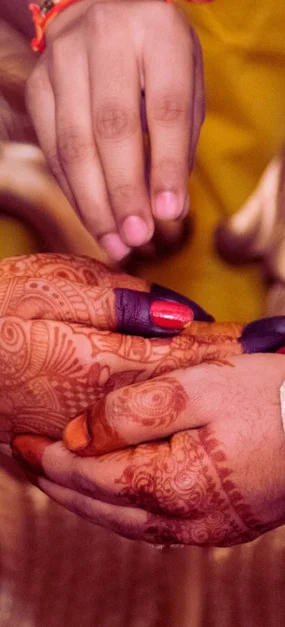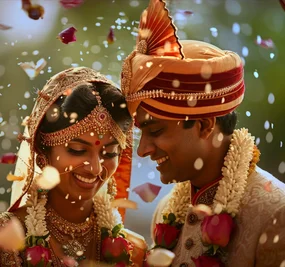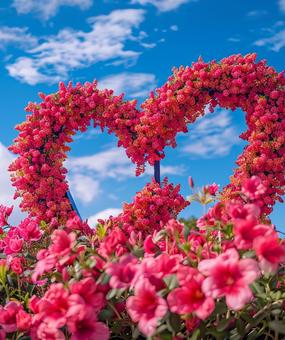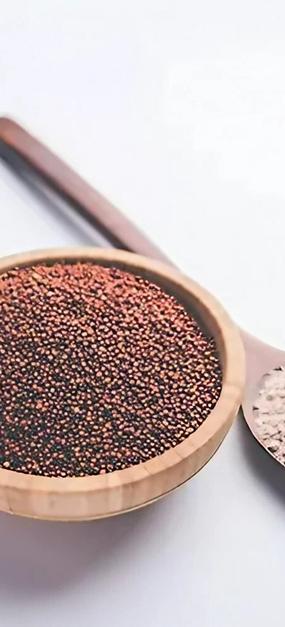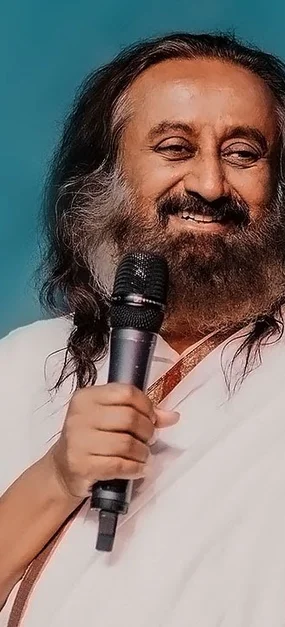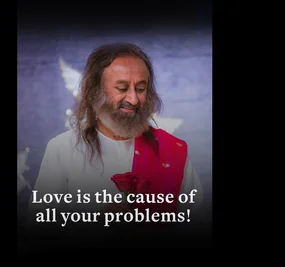We all dream about those perfect moments in life: winning the school sports championship trophy or the academic gold medal, receiving that coveted admission letter to an Ivy League university, and then bagging that first dream job offer. How wonderful was that first paycheck!
But perhaps the most perfect dream is that first proposal, the one leading to the altar of marriage. With that perfect partner and kindred spirit who scored full marks on your personal checklist of must-haves. As young adults, this is probably what we all seek: a companion to hold our hand in the crowd, especially when life throws us those unexpected curveballs.
This is such a universally cherished dream that it has led billions into the marriage system. In India, it is an elaborate ritual-based occasion, and among them, the saptapadi is what completes the marriage vows. Saptapadi vows have been in our culture since Vedic times!
Just as we associate ‘I do’ with Christian marriage vows that bind two people together forever (courtesy Hollywood), saptapadi is associated with Indian marriages and, specifically, Hindu wedding vows. However, maybe because Hindu shlokas are in Sanskrit, more people are not aware of just what vows we make when we tie the knot.
Frankly, it was a bit of a revelation to me, too. I didn’t know the meaning behind the seemingly long and tedious, not to mention ‘inane’ rituals we were subjected to before riding off into the sunset with our ‘happily ever after’. So, if you are curious, like I was, to know just what you said or are about to say or will say one day, or know what ‘they’ are saying (!), join me! We can demystify the saptapadi part of the rituals for now.
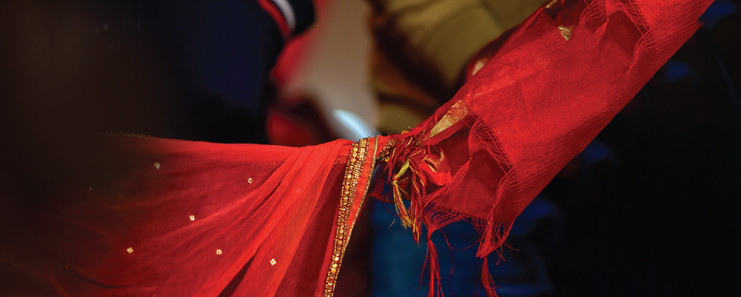
What does Saptapadi mean?
Saptapadi means seven steps in Sanskrit. Sapta means ‘seven’, and Padi means ‘steps’. This refers to the seven steps a couple takes together during their marriage ceremony. In the presence of Agni, the holy fire bears witness to the seven vows of marriage that these steps symbolize.
What happens in Saptapadi?
Well, it is quite romantic, really! You hold each other’s hands, or your garments are knotted together as you circumambulate the sacred fire, agni. Agni is the Vedic God of Fire, who is the witness to all the promises made by the couple. It is believed that the presence of fire represents the all-powerful energy source, the Sun, as well as the life source, the digestive fire within us.
The Hindu belief is that you are not only uniting each other’s names, addresses, families and minds but also your souls. Why this practice is so sacred because on this day, you are considered to be Lord Shiva and his consort, Goddess Parvati. So, your union is as unique as the divine! In fact, that is why you invoke gods and goddesses and invite family and friends – to witness the sacred and blessed union between you and your soulmate.
Sounds deep and serious, right?
Yes, it is, and it is meant to be. That is how important and sacred your union with your partner is considered to be. The elaborate Hindu wedding rituals acknowledge the solemnity and exclusivity of the vows – in all earnestness. In the same vein, these seven promises of marriage seek to unite you with your partner – forever.
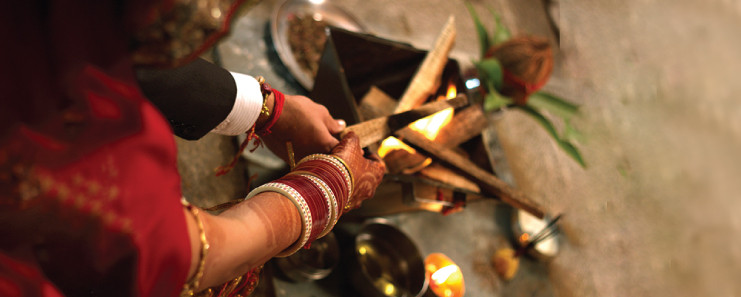
Did you know?
While saptapadi is a time-honoured ritual in South India, saat pheras or seven circumambulations around the agni is common in other parts, especially in North India. Here, couples circumambulate the sacred fire seven times: it symbolizes your union with your partner over seven lifetimes.
In Gujarati weddings, couples only go around the fire four times. The aim is to follow dharma (righteous path), earn artha (wealth), experience Kama (love) and attain moksha (liberation).
Seven Vows of Marriage
When I thought of vows, my first thought was the personalized and customized ones we see in movies. The Hindu marriage vows are slightly different in that we don’t have singular vows written by the couple. All the same, when you go through the process, you feel a tingle of excitement – as the momentousness of the time-tested tradition dawns on you. After all, these vows have been honoured, repeated and followed through the centuries.
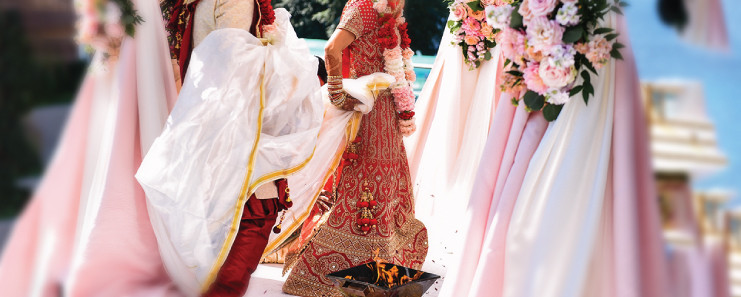
See if your ideas and dreams are encapsulated in the seven wedding vows…
1. You promise to provide each other with the good things of life: food, physical and emotional nourishment and wealth. So, all your basic needs are fulfilled.
2. You promise to look after each other, praying for each other’s physical and mental health and strength. So, there is someone to take care of you at all times.
3. In this vow, you promise to foster affection and liking towards each other. So you feel cherished and loved, enabling you to become a better person.
4. You vow to be lifelong companions. So, in good and bad times, you are not alone.
5. You pray to grow together: in thought and in action. To find a common path amidst differing outlooks.
6. You vow to look after your children, family and society, ensuring their prosperity together. So, with your union, everyone benefits.
7. Finally, you promise to adopt a noble bent of mind, leading a sacred and spiritual life in union. You both agree to walk the philosophical and spiritual path in life.
So, you see, the Saptapadi vows acknowledge and embrace all expectations and ambitions of couples. They have been designed in such a way that every dream you had, have or will have in the future is included in the vows: to seek wealth, success, fame, or spirituality, to become a parent or a philanthropist. These timeless vows have included them all: acknowledging your right to grow and spread your wings in any direction with your special someone.
The legend of Saptapadi
There is a beautiful story behind the Saptapadi tradition and how it began. The story of Savithri and Sathyavan.
When her beloved husband, Sathyavan, dies at an early age, his devoted wife, Savithri follows Yama, the God of death, as he carries away his soul. When Yama realizes that she is following him, he asks her to turn back. She replies that she has already walked more than seven steps with him and, hence, has become his friend. As his friend, she begins a conversation with him. With her wit, and intelligence, she wins over the Lord of Death himself, who grants her husband his life again. Such is the importance of the seven steps in the beginning of friendship or any relationship.
While love probably existed from the time life came into being, it still amazes me that our ancestors had such clarity of vision with regard to the union of two people. They understood that in the journey of life, each person is a friend and an equal partner. They acknowledged the possibility of divergent opinions, the importance of communication in resolving obstacles, and the need to complement and support each other through thick and thin. To such an extent that even death cannot separate the souls that have united.
These seven promises of marriage do not only serve the purpose of personal pledges or bonds made by each partner to live as one. They also take on greater significance in that they bind civilizations together over time and across distances. How? Can you think of anything that connects you with your great-grandfather? Blood ties? Well, apart from that, it is the common aspirations he had when he entered matrimony – that is encapsulated in the Saptapadi marriage vows.
Written by Anusha Chellappa
Based on inputs from ‘Saptapadi’ by D K Hari and D K Hema Hari, founders Bharat Gyan.



